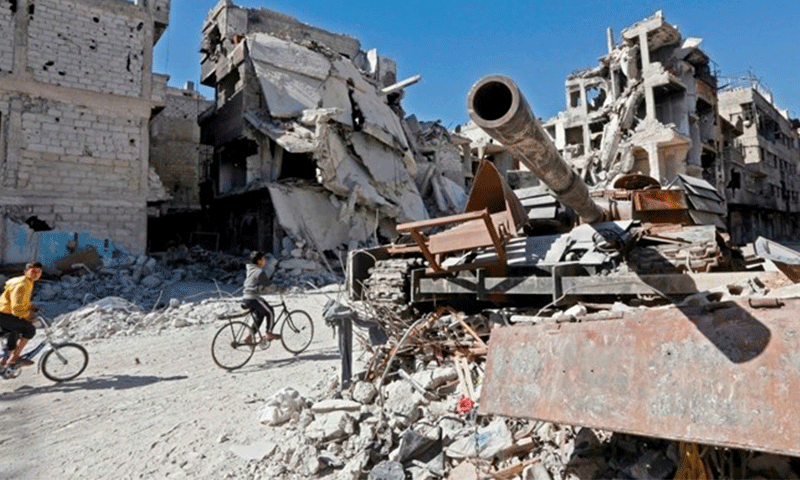



The “Action Group for the Palestinians of Syria (AGPS)” has issued a recent report highlighting the risks underlying Damascus governorate’s new master plan for the reconstruction of the Yarmouk camp neighborhood.
The report was released by the AGPS’s Studies and Reports Department on 27 July, under the title “Yarmouk Camp: What’s Behind the New Reconstruction Plan?”
It discussed the significant discrepancy between Damascus governorate’s regulatory plan issued on 25 June and the original organizational plan for the same area of 2004.
The report warned that the new plan would cause a significant architectural change in the camp due to the destruction of entire streets and houses, which will lead to the disappearance and erasing of its character and particularity.
According to the report, the new plan is a violation of the residents’ ownership rights.
It also indicated that more than 50 percent of the buildings, houses, and shops in the camp would be destroyed in the new organizational schemes without compensating most of their owners for the loss, while some of them will have regulatory shares that do not compensate half of their properties’ areas.
According to the new regulatory plan, the Yarmouk camp is divided into three main areas, depending on the extent of the damage.
The three areas include, “the most damaged areas of 93 hectares, areas of medium damage level of 48 hectares, and the least damaged areas with 79 hectares.”
Moreover, no more than 40 percent of the camp’s population would be allowed to return to their homes in mildly damaged areas on the condition of proving ownership.
The report pointed out that proving ownership is challenging, especially since many people lost their official identity documents during the war, as well as for those sheltered abroad.
The report classified the forms of property deeds within the camp by contract type to title deeds (Tabo) from the cadastre, property by a notary public, ownership under a court ruling, and registered property in real estate departments.
The report concluded a number of recommendations that pointed to the new master plan’s political dimension, as there might be an implicit plan to eliminate the Palestinian cause in the camp, which stands as one of the most important reminders of the Palestinian catastrophe in 1948.
The recommendations also included warnings that the displacement of Palestinian refugees would cause an economic deterioration and would leave a negative impact on their health and education situation.
The report stressed the necessity of benefiting from the opportunity given by Damascus governorate to subject objections to the plan. The AGPS called people to pressure the Syrian regime government through all Palestinian and international levels to reconsider its last regulatory plan of the Yarmouk camp.
According to the AGPS, such pressure might force the regime’s government to implement the 2004 plan that preserves Palestinian refugees’ property, besides facilitating their return.
Last June, Damascus governorate announced its approval of the al-Qaboun area’s regulatory plan and the regulatory map of the Yarmouk Camp in Damascus outside the framework of Law No. 10 of 2018.
This plan was issued within the framework of Law No. 23 of 2015 that provides for “organizing the process of land preparation for construction, according to the general organizational plan and the detailed regulatory plan in the urban development schemes approved by one of the two following methods, the owner’s division, and the regulatory planning of the administrative authority.”
Nevertheless, the Yarmouk Camp’s regulatory plan was rejected by the Palestinians of Syria, amid calls from Palestinian human rights organizations for Damascus governorate to retract the plan, as it is seen as a complete change for the camp’s features.
In an interview with the al-Quds News Agency on 23 July, the Secretary-General of the “Palestinian Popular Struggle Front (PPSF),” Khaled Abdul Majeed said that communications and meetings took place between Palestinian faction leaders and bodies with political parties in the Syrian regime government to cancel the plan.
Abdul Majeed confirmed that memos would be directed to the head of the regime, Bashar al-Assad, defining the political dimensions and symbolism of the “Yarmouk” camp, and demanding a reconsideration of Damascus governorate’s decision.
if you think the article contain wrong information or you have additional details Send Correction